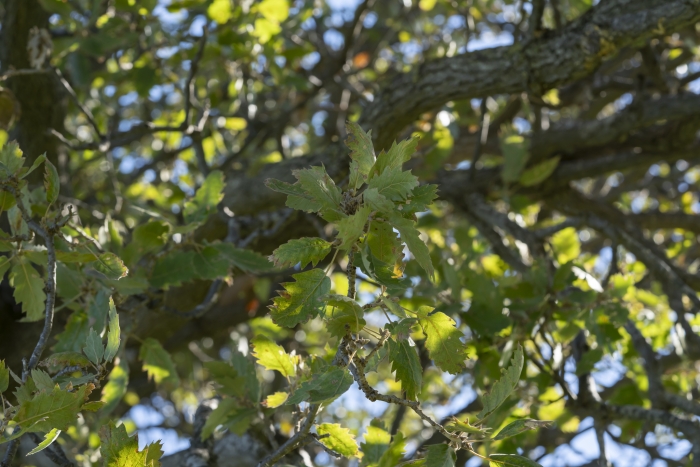Mount Tabor Oak
(Quercus ithaburensis)
Mount Tabor Oak (Quercus ithaburensis)
/
/

Eleftherios Katsillis
CC BY 4.0
Image By:
Eleftherios Katsillis
Recorded By:
Copyright:
CC BY 4.0
Copyright Notice:
Photo by: Eleftherios Katsillis | License Type: CC BY 4.0 | License URL: http://creativecommons.org/licenses/by/4.0/ | Rights Holder: Eleftherios Katsillis | Publisher: iNaturalist | Date Created: 2021-01-20T13:48:51-08:00 |




















Estimated Native Range
Summary
Quercus ithaburensis, commonly known as Mount Tabor Oak, is a semi-evergreen to tardily deciduous tree native to the Eastern Mediterranean region, including parts of Israel, Turkey, and Greece. It is typically found in open woodlands and Mediterranean scrub areas. This species can reach up to 15 meters (49 feet) in height with a rounded crown and often features a gnarled trunk and branches, giving it a distinctive, rugged appearance. The Mount Tabor Oak produces inconspicuous yellowish-green flowers from March to April, followed by oval acorns that are up to 5 cm long and 3 cm wide, with a cap covering about one-third of the acorn. These acorns mature in 18 months and drop in the second autumn after pollination.
The Mount Tabor Oak is valued for its drought tolerance and ability to thrive in hot, dry climates, making it suitable for xeriscaping and as a shade tree in arid landscapes. It is also used for reforestation projects and habitat restoration. In cultivation, it requires full sun exposure and can tolerate a range of soil types, provided they have medium drainage. While it can manage with medium amounts of water, it is also capable of withstanding periods of drought once established. Gardeners should be aware that this oak may be susceptible to oak wilt and other common oak diseases.CC BY-SA 4.0
The Mount Tabor Oak is valued for its drought tolerance and ability to thrive in hot, dry climates, making it suitable for xeriscaping and as a shade tree in arid landscapes. It is also used for reforestation projects and habitat restoration. In cultivation, it requires full sun exposure and can tolerate a range of soil types, provided they have medium drainage. While it can manage with medium amounts of water, it is also capable of withstanding periods of drought once established. Gardeners should be aware that this oak may be susceptible to oak wilt and other common oak diseases.CC BY-SA 4.0
Plant Description
- Plant Type: Tree
- Height: 20-50 feet
- Width: 20-40 feet
- Growth Rate: Moderate
- Flower Color: N/A
- Flowering Season: Spring
- Leaf Retention: Deciduous, Semi-Deciduous
Growth Requirements
- Sun: Full Sun
- Water: Medium, High
- Drainage: Medium
Common Uses
Bee Garden, Bird Garden, Butterfly Garden, Low Maintenance, Rabbit Resistant
Natural Habitat
Native to open woodlands and Mediterranean scrub areas in the Eastern Mediterranean region
Other Names
Common Names:
Scientific Names: , Quercus ithaburensis, Quercus aegilops var. ithaburensis, Quercus macrolepis subsp. ithaburensis, Quercus aegilops subsp. ithaburensis,
GBIF Accepted Name: Quercus ithaburensis Decne.